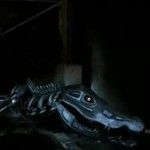Tai Chi Hero
aka 太極Ⅱ:英雄崛起 aka Tai Chi 2: The Hero Rises
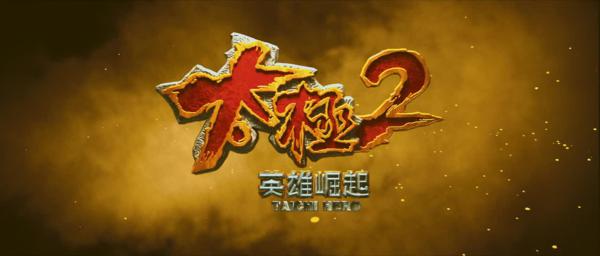
2012![]()
Written by Chang Chia-Lu and Cheng Hsiao-Tse
Directed by Stephen Fung Tak-Lun
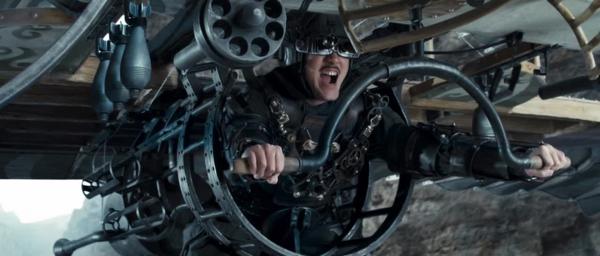 |
|
How do I pee in this thing???
|
While Tai Chi Zero spent most of it’s running time setting up an Eastern tradition vs. Western modernism dichotomy that clashed with the very editing processes used to make Tai Chi Zero visually entertaining if nothing more than fluff, Tai Chi Hero tries a different tact. A method of uniting the different aspects of not only the film series, but of the culture clashes and personal clashes. The film is all about reconciliation, reunion, and combining into a greater whole. A balanced whole between the yin and yang, which is a part of the philosophy of tai chi.
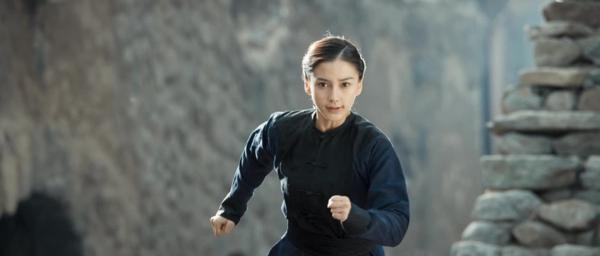 |
|
Suddenly the movie goes all Forrest Gump!
|
There are still lots of plot lines to resolve, since the last film didn’t bother to finish anything up. And don’t expect everything to get resolved this time, either, though at least most of the problems are solved. At the last minute. Tai Chi Hero‘s attempts to have more of a story feels better, but conflicts with the flashy editing and choreography that was the only charm of the first part. So while being a better film on the whole, Tai Chi Hero manages to disappoint in the area that gained it fame, while not making enough up in the other aspects. Instead of the parts balancing together into a better whole, instead we just a big confusing mess, which defeats the whole message of the film! This is where Homer Simpson would say “D’oh!”
If you see one Tai Chi -ero movie, make it Hero, but seriously consider grabbing something else. Make it a balanced viewing where you also watch a decent film.
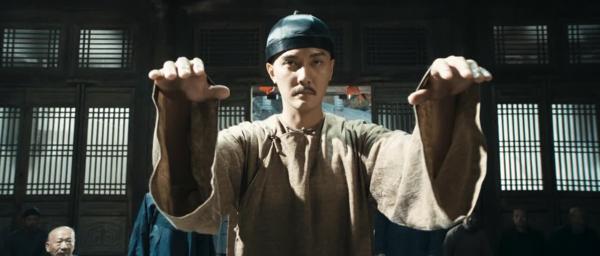 |
|
Rah rah, ah ah ahh
Roma, Roma ma ah GaGa, Ou lala |
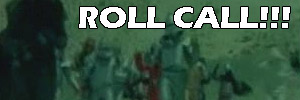
|
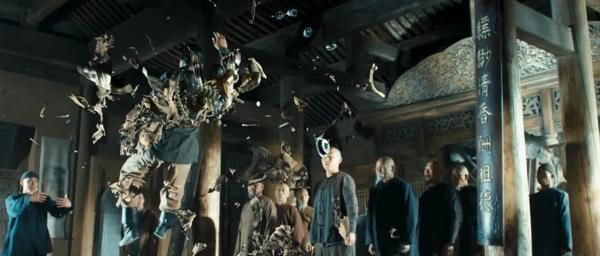 |
|
More clockworks than A Clockwork Orange!
|
 |
|
Technology sucks! Unless it’s on our side!
|
We start out with a wedding, the uniting of two families. This also solves the problem of Yang Lu Chan being an outsider, by marrying Chen Yu Niang he becomes part of Chen Village, even marrying into the family of its leader. Their wedding is interrupted by the arrival of powerful strangers, who turn out to be Chen Yu Niang’s long-missing older brother and his wife. Master Chen Chang Xing is not happy to see his oldest son, though we don’t find out why until much later.
Yang Lu Chan’s life is not saved just by getting married, but he must learn Chen style kung fu, and Chen Yu Niang has to teach him to balance his yin and yang. Master Chen seems more sympathetic towards Yang Lu Chan than he was in the prior film, where he was largely manipulating Yang Lu Chan to serve his own needs. You can also argue that he sees Yang Lu Chan as a substitute son for his eldest child, though that sort of screws over all of his other children. And while the relationship with Chen Zai Yang becomes a focus of this film, the other two sons are basically background characters that just serve to enforce whatever superstitions the villagers are spouting off. They have neither the leadership nor charisma as Chen Zai Yang or Chen Yu Niang, or even Yang Lu Chan.
One of the major elements of both films is Chen village’s reluctance to train their kung fu style to outsiders. This is explained via a short flashback where a Mad Monk (played by Daniel Wu) hangs around town for a week or so insulting everyone, and is then revealed to have a captured former student who used Chen style kung fu for evil. But after spending the week with the Chen village residents, he realized they are all good people, and warned against training any more outsiders, under threat of disastrous consequences. This legend has gown over the decades to become the de facto law of the town. As an added note, Patrick Tse Yin plays the Chen village elder in the flashback, in one of the few times I’ve seen him without sunglasses in the past decade.
Chen Zai Yang was run off for not wanting to practice kung fu, but instead working on mechanical devices and engineering. Chen Zai Yang’s return has its own plots, which end up backfiring when discovered and Chen Village gets attacked by Fang Zi Jing and an army of cannons. Chen Chang Zing surrenders to save the city and try to get Yang Lu Chan and Chen Yu Niang out, but the vast army is too much and all three are almost captured…until Chen Zai Yang returns flying a new flying creation, with bombs. This allows him to save his sister and her husband, even as he is forced to eject because of the weight and is captured. Thus Chen Chang Xing is reunited with his oldest son in prison, where the two reconcile.
It was though the use of traditional martial arts combined with technology that allowed the saving of Yang Lu Chan and Chen Yu Niang. Another moment of balance.
 |
|
A moment of sorrow for the little engine that couldn’t
|
 |
|
Red hat peer pressure!
|
Yang Lu Chan must fight his way through a series of opponents to prove his skills worthy of meeting a Master Li(Yuen Biao), who works for Prince Dun(Mickey Yuan Wen-Kang), and can settle the matter of Fang invading Chen Village and capturing Master Chen. The quest ends with a battle atop the walls of the food preparation area for Prince Dun’s dinner. The battle isn’t about who is the best, but to see if Yang Lu Chan has learned the principles of Chen style kung fu and become balanced as a greater whole. Prince Dun is impressed enough he declares that Chen style kung fu is now called tai chi, and everyone is like “Oh, thanks for naming our martial art, Prince!” Prince Dun promises to look into things, and let’s just say they should have named him Prince Dun ex Machina because of how everything is instantly fixed! What a hand-waving of an ending.
As Yang Lu Chan becomes more balanced, he begins to see the energy patterns of the world around him, shown on screen using a process similar to the mapping of kung fu moves from Tai Chi Zero. This would have been a cool thematic continuation had they shown the technical process of moves gradually turning into the flow of energy, but it wasn’t and is instead just a one-time visual effect. While not the only flaw in how things could have been improved, that’s a good enough example of the numerous missed opportunities.
Nikki Hsieh Hsin-Ying is great but wasted in her mute role as Chen Zai Yang’s wife. Let’s also give a special shoutout to Peter Stormare, chewing the scenery with acting so awful I’m not sure what could have happened, as Stormare is almost always awesome. He must have fallen into that vortex that all white people get trapped in when they appear in Chinese film and their ability to sound like a normal person disappears.
The antagonism of cultures present in the theme of Tai Chi Zero is total 180ed for the theme of uniting and balanced. This message that things can and should be balanced, and not outright rejected, is a better message, in my opinion. While I am not one to say that a better message makes a better film, a message with more relevance is more likely to be remembered and discussed in the future. Not that I think people a decade from now will bother with either Tai Chi Z/Hero.
 |
|
It’s true, I’ll be going by AngelaBaby even when I’m 95!
|
 |
|
Duck, cameraman!
|
Rated 6/10 (Balance, guilty, practice, token, dirty joke, wanted)
Please give feedback below!
Email us and tell us how much we suck!


 |
|
The look of people who were excited for the first film while watching it.
|
 |
|
Ring ding dong ring a ding ding ding dong Keep your heads ringin’
|
 |
|
Never star in a RZA movie…ever!
|
 |
|
The new season of 24 changed so much!
|
 |
|
If it wasn’t for the decorative lion heads, these cannons wouldn’t even work!
|
 |
|
No one is looking at the plane that’s doing crazy tricks while murdering them!
|
 |
|
The days before safety razors
|
 |
|
Flour power!
|
 |
|
It went bankrupt before it opened because the entire budget went to ridiculous decorations
|




